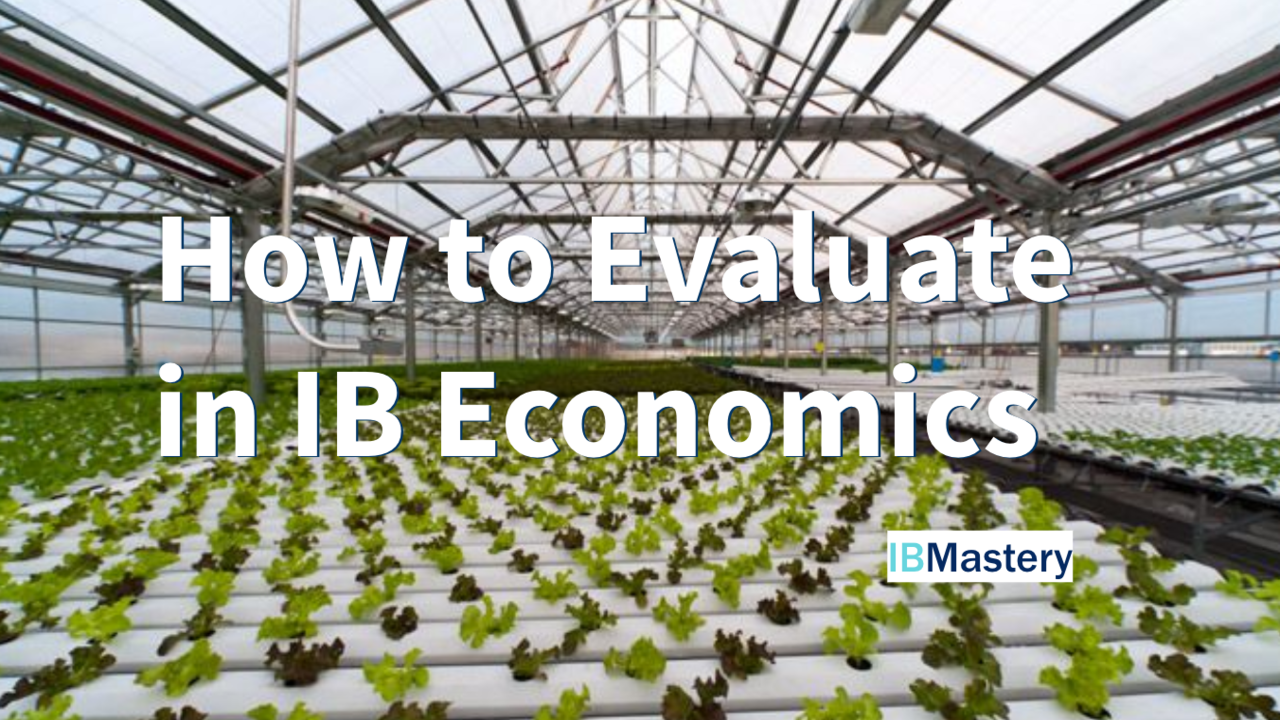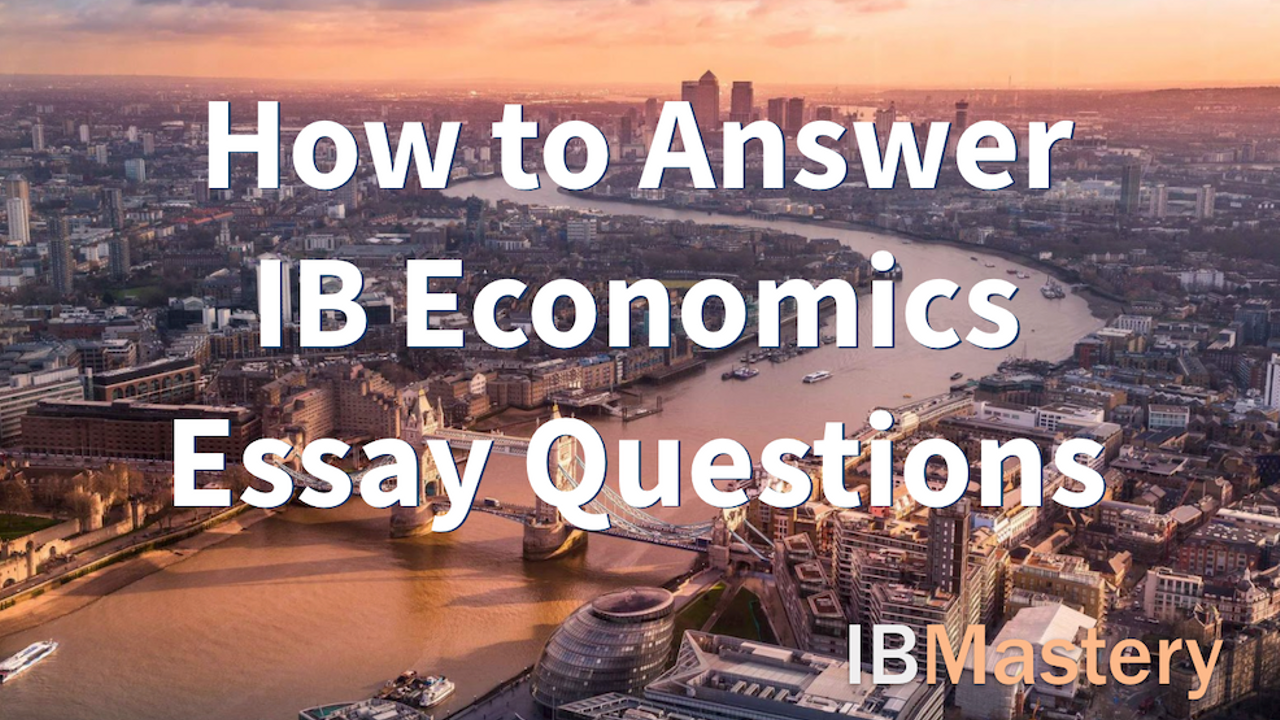How to Write the Economics Internal Assessment (Getting Started)

The IA is a brilliant opportunity to put some marks in the bank and make that 6 or 7 in the course much easier to achieve. This first article will focus on choosing an appropriate article.
Why does this matter?
If you choose a bad article you’ll find it like competing in the Olympic 100 meter dash wearing your granny’s high heels. It doesn’t matter how good you are. Your name might be Usain Bolt. You’re working with the wrong equipment, so you’re gonna get beat. Here, just like in your Extended Essay and so much else in life, you’ve got to make good decisions at the start of the thing to end up where you want to go. Actually, you need to decide on the concept you want to explore BEFORE you go looking for your article. You should normally focus on one of the really major concepts like supply and demand, market failure, or aggregate supply and taxes. And once you've done that you'll know what type of article you're looking for.
How to find the perfect article for your commentary
- Of...
Evaluation in Economics - Using CLASPP

Evaluation is a very important concept in IB Economics. But before we evaluate we always analyze.
Analysis is providing the DEED aspects --your Definitions, Explanations, Examples and Diagrams to show how the theory helps to answer the question.
Evaluation vs analysis
Basically, analysis is explaining the relevant theory. Whereas evaluation is where you reflect and notice effects of the policy and show your critical thinking (i.e. noticing limitations of the theory and making links to your key concept).
Economic theories (i.e. our diagrams) always suggest certain things are true --for example that price ceilings will result in shortages. However, our field is full of interesting assumptions and exceptions. For example, price ceilings don't always result in shortages, because they might be set above the current equilibrium price.
There are also uncertainties and priorities to consider when we're exploring a policy. Remember that in your IA, for example, you're almost always lookin...
How to Structure an Economics IA

This post will go through what you should write in your Economics IA, with step-by-step instructions and with word counts for each section.
What you need to know before you write:
- Avoid writing anything that isn’t going to earn you marks. You're going to need all the words you can get for your analysis and evaluation. Avoid quotes from the article and introductions longer than 2 sentences.
- Stick with one unit of the course (i.e. Micro, Macro, and then Global). Don’t start off in micro (apple prices rise, supply and demand, elasticity) and then evaluate the potential macro effects (this could hurt economic growth). Even if this is true, the IA is about going deep into one part of the course, rather than showing the linkages between different parts.
- Less is (often) more. Because of the very constraining word count (800 words) you’ll want to focus on really developing just one or two (two at the most) diagrams in your IA. And only evaluate one potential solution (the one in the arti ...
The best time to work is the worst
A while ago I wrote an article called The Straight A Students Time Management Secret. The answer seemed simple: get your work done during your school day. High achievers do report having this habit. When they’re working, they just work. They don’t spend much time inefficiently --half-doing work and half-socialising at the same time. The benefits are pretty obvious. More completely-free time in the evenings, they can get more sleep and they can socialise guilt-free and stress-free. But, actually implementing this advice can seem hard. At work/school, all of our friends are there. It’s distracting. And then suddenly the entire day has passed and we’ve made no progress. Here are a few techniques that work:
- Block out some set-times every week just for working by yourself. Maybe Thursdays at lunch you go to your secret, private spot in the library and work on Math questions. Stick to your own schedule.
- Get massive headphones and wear them when you’re working. Obviously, you don’t even ...
We're Looking For Some Great IB Teachers
First of all I'd like to thank those of you who have already given me some names of great IB teachers. If you'd like to add a nomination, please do that here.
#IBGreat?
I'm on the lookout for some of the really great IB teachers in the world. I want to connect with them, talk with them and help them spread their best insights.
For example:
Maybe you have a really good IB Biology teacher at your school. Students just love this woman. I could talk with her and then write about one of her exam tips or an insight about how she approaches the course.
I want to learn from great people, so I can make hard things easier for other great people. That's my mission.
Positive Recognition
I'm hoping a bi-product of this is that I can bring a lot of recognition to a lot of teachers who work really hard, but maybe haven't gotten a lot of positive attention before. Teaching can be a solitary job sometimes, so it couldn't hurt to make your favourite teacher internet-famous.
Teachers are welcome ...
The Straight A Students Time Management Secret

This is your lucky day. You are finally going to find out the secret time-management weapon which has only been known to a few wildly successful students. Until now.
(WARNING: Do not read this unless you are prepared for incredible academic success! However, if ready to have your life completely changed, read on.)
I have had the pleasure of teaching students who have ended up going to Cambridge, to Oxford, to LSE, to Harvard and to a range of other Ivy League universities. They were not completely alike, but they did have one behavior in common. After working closely with these students I am convinced that it was this single secret-behavior that set them apart from the crowd. It actually made it easier for them to learn more efficiently, to understand concepts in a deeper way than their peers. In a way, these students had an unfair advantage. And that’s why I feel you should have it too.
But before I share it with you, let me explain how hard-working students commonly behave.
Often...
How to Structure a Theory of Knowledge Essay

The following structure is a very good, step-by-step method you can use on any TOK essay to get a great mark. (It is updated for the 2022 syllabus).
You can find our video analysis of the most recently May and November Theory of Knowledge Essay Prescribed Titles in our members area. We also have a lot of helpful advice, tutorials, and evidence videos there. And of course you're welcome to try it. We'll also give you a lot of videos, notes and other resources to help with with your TOK Exhibition, here.
Okay here we go...
First, choose your Prescribed Title
Before you can begin your essay, you’ll want to look at the Prescribed Titles and choose one of them. Take some time to think about them before you choose. Sometimes the simple one is not the best one--perhaps because you can't think of any interesting ideas, just the most obvious ones. Complicated questions can make for more interesting essays.
The most important thing to remember is that your #1 priority is to answe...
The Top Ten Theory of Knowledge Essay Tips

Here are my top tips for getting to top marks on your Theory of Knowledge essay.
1. All ToK essays are about the prescribed title, but also about how we know in general. Make sure to keep your essay linking back to the knowledge aspect, rather than to 'how society is' for example.
2. But be careful about which AoK's you include. Review all of your notes to refresh your understanding and make sure you’re seeing the relevant connections and make sure (after you’ve done your research) that you have interesting points to make (claims and counter claims).
3. Make an outline first. The outline is your road map and it’s where you make a lot of your major decisions. It will also help you to develop an argument, with each paragraph building on the one before.
3. Research in a lot of different ways: websites, your class notes, talking with people (parents, classmates, your teachers). Find arguments which support both sides of (for and against) your thesis and examples that support your clai...
Knowledge Questions in International Baccalaureate Subjects


Recently we had our staff compile a list of some knowledge questions in different subjects. They came up with a pretty good list, which I thought a lot of ToK students and teachers would appreciate having.
Some of the questions fit neatly in a given subject area, while others fit in more than one subject.
History
Are historical claims restricted by the language they use?
Is all history biased?
How important is the role of statistics in history?
Does history show we have made ethical progress?
To what extent does emotion play a role in historical interpretation?
Is historical objectively possible?
To what extent does historical knowledge change over time?
How is knowledge about the past different from other kinds of knowledge?
How does the language used to describe the past change how history is understood?
Natural science
(Key words: scientific method, Popper's principle of falsification, scientific revolution and paradigm shift)
Is language necessary for the cons...
The IB Economics Paper 1 Essay Structure

In the new syllabus (May 2022 exams onward) and get to choose 1 out of 3 questions, chosen from any of the 4 units. Paper 1 is worth 20% of your final for HL students and 30% for SL students.
You'll get get 75 minutes (1 hour and 15 minutes). That seems like quite a lot of time and it is, but you're expected to do a lot in that time, so you'll need to be careful to do everything you need to do in the time you get.
It’s easy to waste time (i.e with lengthly introductions or descriptive writing) that earn you no marks at all.
If you use this structure you’ll be sure to earn all of the possible marks for each of your IB Economics Paper 1 essays.
Part A - 10 Marks (Roughly 30 Minutes)
Answer the question using real case studies and theory from the course.
Definitions and your real life example
In a quick introduction paragraph, do the following:
- Start with a sentence explaining part of what the question is about, using a keyword from the course, if possible.
- Define a key wor ...






